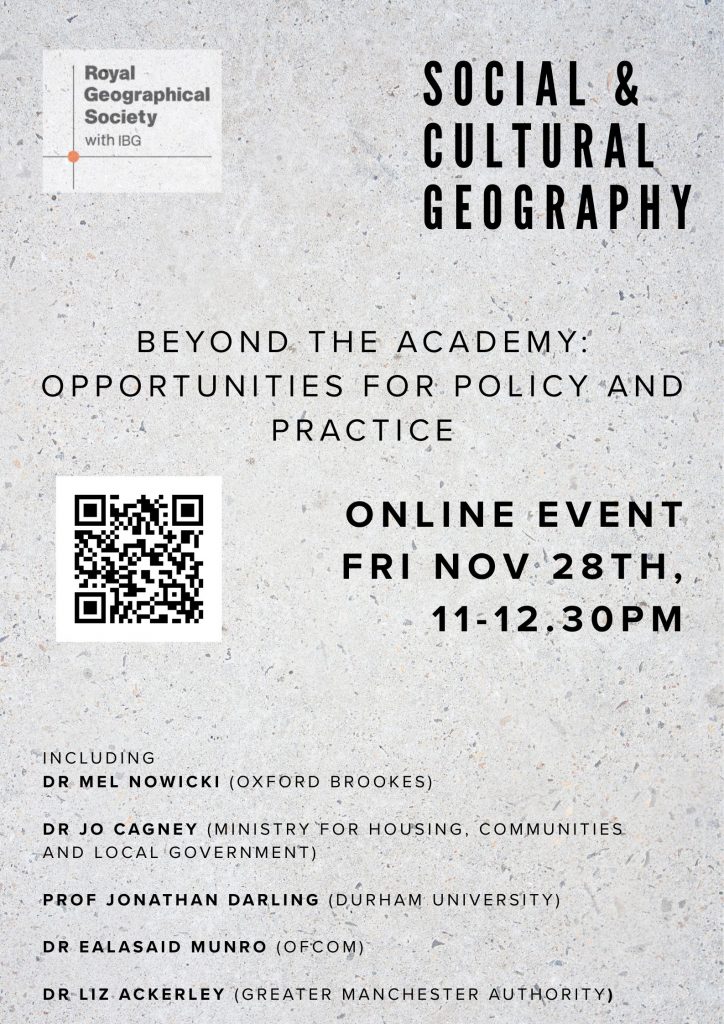We’re thrilled to announce another exciting workshop for our early career event series. Please feel free to join and share.
Social and Cultural Science Policy Interfacing Pathways: Understanding, Knowledge and Career Journey
12.00 – 12.40 (GMT) 28 November, via Zoom
Professor Nidhi Nagabhatla
Registration: https://shorturl.at/yUtS7
In this event, Nidhi will share her rich experience and tips with junior colleagues on how to navigate Social and Cultural Geographies’ Science Policy Interfacing Pathways much more easily and confidently. This event is specifically friendly to junior geographers interested in developing their career, including how to exert larger policy-making impacts of their projects mingling with diverse stakeholders.
The intersection of science and policy has become increasingly vital, creating a wealth of career opportunities for individuals passionate about making a difference. Science policy interfacing focuses on how scientific knowledge can inform public policy decisions, ensuring that evidence-based practices are integrated into governance and societal frameworks. This dynamic field offers diverse pathways for those interested in bridging the gap between scientific research and policymaking, making it an exciting area for aspiring professionals. Entering the realm of science policy often begins with a solid educational foundation.
To succeed in policy interfacing, a strong foundation in social scientific literacy is crucial for effectively translating complex research findings into actionable policy recommendations. The ability to convey complex information clearly and concisely is vital for influencing decision-makers. Analytical skills are also important. Furthermore, strong interpersonal skills are essential for building relationships with stakeholders across sectors—scientists, policymakers, advocacy groups—facilitating effective collaboration. Early career researchers are increasingly as valuable contributors to the science-policy interface. They bring fresh perspectives and up-to-date knowledge of current research trends that can enhance evidence-informed policymaking. ECRs can engage through co-created initiatives aimed at bridging research with policy needs while seeking mentorship from established professionals in the field.
Nidhi Nagabhatla is Senior Fellow and Cluster Coordinator: Nature, Climate and Health program at United Nations University (CRIS) and Research Professor at University of Ghent, Belgium. She is Sustainability Science Specialist and System Analyst. With >23 years of work experience, she has led, coordinated, and implemented transdisciplinary projects in various geographical regions of Asia, Africa, Europe, and Americas working with international organizations, viz., IWMI, World Fish Centre, IUCN, Asia Pacific Climate Centre, and United Nations University (INWEH) leading research and capacity development initiatives. She is also affiliated with leading academic institutes: Oxford University (UK) and Leibniz University (Germany) in various roles, mostly related to sustainability research, science-policy interfacing, and mentoring young professionals. She is Adjunct Associate Professor at the School of Earth, Environment & Society McMaster University, Canada, and Guest Professor at Universidad Mayor de San Andrés, Bolivia. She serves as Chair of The Partnership for Environment and Disaster Risk Reduction (UNEP) and co-leads the ‘Water and Migration Working Group’ of The Food and Agriculture Organization (FAO) of the United Nations. She also served on the Technical Committee of The Intergovernmental Science-Policy Platform on Biodiversity and Ecosystem Services (IPBES) from 2013 to 2018 and was Lead Author in the Global Assessment Report. She also served as Vice-Chair and Chair of the Steering Board for Young Professional Platform for Agriculture Research and Development (YPARD), FAO from 2011 to 2018.
Currently, she is actively involved with three expert working committees of the UN Decade on Ecosystem Restoration (2021-2030). She holds a doctoral degree from the Indian Space Research Organization in Environmental Science, post-doctoral experience working Consultative Group for International Agricultural Research (CGIAR), and a diploma in International Humanitarian Law from The National Academy of Legal Studies and Research, India. She holds executive education from Saïd Business School, University of Oxford, where she affiliates as a Chevening Fellow with the Future Leaders Programme of the Foreign and Commonwealth Office, UK. She has published more than 200 papers as peer-reviewed journal articles, chapters, conference papers, workshop contributions, and policy briefs and serves on the editorial and review committee of numerous international journals.







